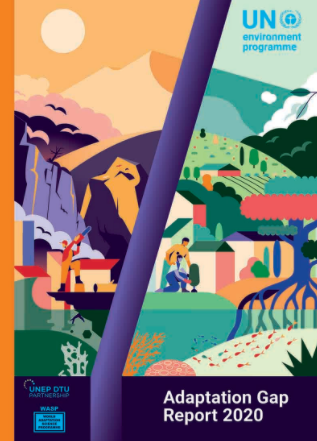UN report warns - step up climate change adaptation or face serious human and economic damage
- January 28, 2021
- Posted by: Elaine Coles
- Category: Environmental, Global, Reports, Water Issues

The United Nations Environment Programme (UNEP) is calling on the international community to expand both efforts and funding to develop nature-based solutions (NbS) to facilitate adaptation to climate change and water hazards in developing countries.
The call comes in the UNEP Adaptation Gap Report 2020 which finds that while nations have advanced in planning, huge gaps remain in finance for developing countries and bringing adaptation projects to the stage where they bring real protection against climate impacts such as droughts, floods and sea-level rise.
UNEP says that public and private finance for adaptation must be stepped up urgently, along with faster implementation.
Nature-based solutions – locally appropriate actions that address societal challenges, such as climate change, and provide human well-being and biodiversity benefits by protecting, sustainably managing and restoring natural or modified ecosystems – must also become a priority.
The report places a special focus on nature-based solutions as low-cost options that reduce climate risks, restore and protect biodiversity and bring benefits for communities and economies.
An analysis of four major climate and development funds – the Global Environment Facility, the Green Climate Fund, the Adaptation Fund and the International Climate Initiative – suggested that support for green initiatives with some element of nature-based solutions has risen over the last two decades.
Cumulative investment for climate change mitigation and adaptation projects under the four funds stood at USD 94 billion. However, only USD 12 billion was spent on nature-based solutions – a tiny fraction of total adaptation and conservation finance.
Annual adaptation costs in developing countries are estimated at USD 70 billion. This figure is expected to reach USD 140-300 billion in 2030 and USD 280-500 billion in 2050.
UNEP finds that while nations have advanced in planning, huge gaps remain in finance for developing countries and bringing adaptation projects to the stage where they bring real protection against climate impacts such as droughts, floods and sea-level rise.
Nature-based solutions, critical for adaptation, need to receive more attention
The report says that as temperatures rise and climate change impacts intensify, nations must urgently step up action to adapt to the new climate reality or face serious costs, damages and losses,.
Adaptation – reducing countries’ and communities’ vulnerability to climate change by increasing their ability to absorb impacts – is a key pillar of the Paris Agreement on Climate Change. The agreement requires its signatories to implement adaptation measures through national plans, climate information systems, early warning, protective measures and investments in a green future.
Public and private finance for adaptation must be stepped up urgently, along with faster implementation. Nature-based solutions – locally appropriate actions that address societal challenges, such as climate change, and provide human well-being and biodiversity benefits by protecting, sustainably managing and restoring natural or modified ecosystems – must also become a priority, the report concludes.
“The hard truth is that climate change is upon us,” said Inger Andersen, Executive Director of UNEP. “Its impacts will intensify and hit vulnerable countries and communities the hardest – even if we meet the Paris Agreement goals of holding global warming this century to well below 2°C and pursuing 1.5°C.”
“As the UN Secretary-General has said, we need a global commitment to put half of all global climate finance towards adaptation in the next year,” she added. “This will allow a huge step up in adaptation – in everything from early warning systems to resilient water resources to nature-based solutions.”
Nature-based solutions for adaptation can make a huge contribution
The report places a special focus on nature-based solutions as low-cost options that reduce climate risks, restore and protect biodiversity and bring benefits for communities and economies.
An analysis of four major climate and development funds – the Global Environment Facility, the Green Climate Fund, the Adaptation Fund and the International Climate Initiative – suggested that support for green initiatives with some element of nature-based solutions has risen over the last two decades.
Cumulative investment for climate change mitigation and adaptation projects under the four funds stood at USD 94 billion. However, only USD 12 billion was spent on nature-based solutions – a tiny fraction of total adaptation and conservation finance.
The Global Commission on Adaptation has estimated that a US$1.8 trillion investment in the areas of early warning systems, climate-resilient infrastructure, improved dryland agriculture, global mangrove protection and resilient water resources could generate US$7.1 trillions of avoided costs and non-monetary social and environmental benefits.
The report emphasises that additional adaptation finance is critical to enhance adaptation planning and implementation and limit climate damages, particularly in developing countries.
Strong mitigation action would significantly reduce unavoidable damage costs, particularly in Africa and Asia, which will bear the brunt of future adaptation impacts. The report is highlighting that the benefits of investing in adaptation often outweigh the costs.
Click here to download UNEP Adaptation Gap Report 2020
